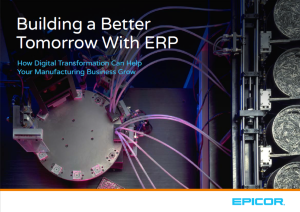Published on the 22/03/2018 | Written by Epicor

Embedding data, analytics, and sensor technology is crucial for manufacturers who want to get fit for growth…
Digital transformation is sweeping through the manufacturing sector as businesses move to capitalise on the Internet of Things (IoT), advanced analytics, cloud technologies, artificial intelligence (AI), and more. Leading manufacturers see these new technologies as game-changers – enabling them to redefine business models, revolutionise internal operations, and improve customer experience.
For decades, manufacturers have opted to cut costs in order to achieve growth, but today digital technologies are playing a vital role. When effectively integrated throughout every part of a business’ operations, digital transformation positions companies for sustained growth by connecting their extended ecosystem of partners, suppliers, and customers.
These capabilities are no longer experimental innovations or proofs of concept. They are in production, proven and are quickly becoming a necessary ingredient for growth, and for many, survival.
Understanding digital transformation
Digital transformation does not exist in its own discrete context. It is a response to burgeoning issues within a global economy that is faster, more connected, and aggressively competitive. It is not an end destination or state of being, but a combination of applied digital technologies and processes that accelerate your business toward its strategic objectives and push it further along the Industry 4.0 track.
Start with strategy
The velocity and scale of technological change can feel as overwhelming and risky as leaping onto a high-speed train. Leaders may wonder how it’s even possible to harness the power of digital transformation when technology seems to become obsolete almost as soon as it arrives.
Instead of focusing on all the risks, possibilities, and benefits of new technologies all at once, first define your overall business goals. What do you hope to achieve in the next one to three years? What factors will you use to measure business success and growth?
Once your business goals are defined, the digital tools that offer the greatest opportunity to achieve them will emerge. Those technologies can then become part of your growth strategy – steps you’ll take on your journey.
Successful digital transformation doesn’t happen overnight, and it looks different for each company. Deploying new technology for technology’s sake can short-circuit your digital aspirations. Instead, your company’s overall growth strategy can guide and lead your digital transformation.
“Deploying new technology for technology’s sake can short-circuit your digital aspirations.”
The research, conducted by Morar Consulting on behalf of Epicor, questioned 2,450 business decision makers and employees in businesses in 12 countries across the globe, about their growth performance in the last 12 months. For further information on the research, click here.
Many competing technologies profess to drive digital transformation – however, the utility of any given digital solution depends almost exclusively on context. You need to understand where you are in your digital transformation journey and how specific technologies can add value to your business. Against a backdrop of fierce competition and rapid evolution, this means identifying the areas in which you can make the smallest change for the maximum ROI. The starting point in getting fit for growth is to understand your market and business inside out.
Define your growth objectives
To get started, you need to establish what works, what requires immediate attention, and where digital transformation can add real value. With your clearly defined growth vision, you are ready to set investment priorities for digital transformation.
For manufacturers, defining these priorities might mean a trade-off between operational efficiency and improving the customer experience. The risks of holding excess inventory or missing order delivery deadlines are costly to the business. You must take an honest look at which areas are your biggest hindrance to growth – and which areas offer the greatest opportunity for lasting success.
Three digitisation technologies with the potential to impact operations:
|
Source: “What Does Digitalisation in Manufacturing Mean Now?” Greg Cline, Aberdeen Group, 2017
Derive new operational efficiencies
For some, digital transformation will mean investing in Industry 4.0 technologies that connect, integrate, and automate production – introducing AI, sensors, actuators, and drivers that facilitate the autonomous exchange of information. IoT technologies such as smart sensors can predict equipment failure and send alerts that trigger automated responses, while automation can optimise supply-chain shipment logistics and inventory management.
Differentiate the customer experience
For some manufacturers, digital transformation will come as a response to increased pressure from customers to produce shorter, customised runs on products, and a more personalised experience – at the same cost. Manufacturers must track and understand customer data and invest in systems that give them the insight they need to provide the tailored, transparent, and positive experience that buyers now demand.
Visibility and insight are key
The key to successful digital transformation is having the visibility and insight to understand where technology can add the most value for your business. Manufacturers have more data than ever before, but few possess the technology to derive real value from that data. IDC estimates that less than 10 percent of data held by manufacturers is used effectively.
To effectively use this data, companies can invest in technologies that add value by providing business-critical insights. Manufacturers need an industry-specific enterprise resource planning (ERP) solution that delivers real-time, in-depth data to transform their operations and enable them to seize growth opportunities.
Better visibility into all areas of your business enables smarter and faster decisions, brings new operational efficiencies, and enhances the customer experience. Whatever digital transformation looks like for your business, applying the right tools can mean the difference between merely competing and thriving.
Invest in the right technologies
Investing in new and innovative technologies is important, but the key is investing in technology that adds strategic value for your business. As many as 88 percent of manufacturers plan to invest significantly in technology in the next year, but high-growth companies invest where it counts.
According to the MORAR study, the top investment priorities for manufacturers include inventory management, cloud, big data, CRM, and mobile. This highlights a clear move toward digital technologies that will provide the level of visibility and insight required to define a data-driven strategic vision, as well as those that enable the collaboration necessary to realise that strategy.
Further resources
For manufacturers wishing to explore digital transformation further the eBook, “Building a Better Tomorrow”, will help you understand how digital transformation can help get your manufacturing business set for growth.
Read the eBook now to find out why it’s important to:
- Embrace the latest technologies, align to changing customer expectations, and adapt to the digital world
- Leverage ERP solutions to see the most benefits and add the most value
- Invest in integrated solutions for real-time decision making
Register to download the ebook: Building a better tomorrow with ERP
This eBook is part of a complete resource library for manufacturers. This includes video, infographic, and white papers that can help you inform your digital transformation journey and Industry 4.0 initiatives.





























